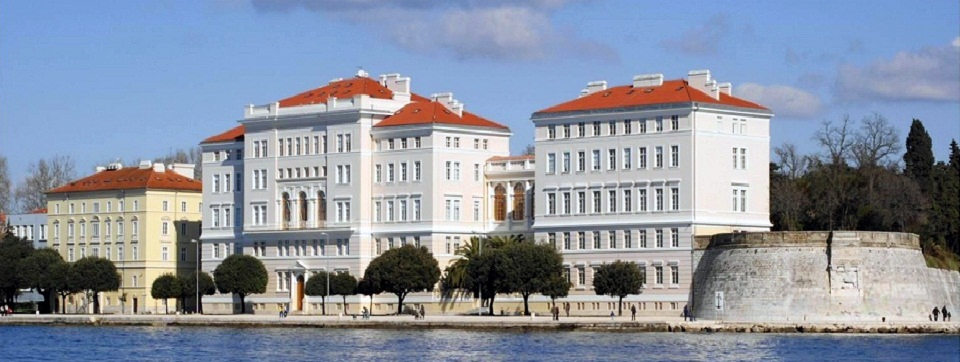Universities in Croatia

The Croatian higher education system has a long educational tradition preserved primarily through the work of its public universities, which are (in alphabetical order): J.J. Strossmayer University of Osijek, Juraj Dobrila University of Pula, University of Dubrovnik, University of Rijeka, University of Split, University of Zadar and University of Zagreb. The University of Zagreb, founded in 1669, is the oldest continuously operating university in South-Eastern Europe.
Binary system: university and professional studies
Croatia has a binary higher education system, meaning that prospective students can choose between two types of higher education studies:
- University studies consisting of academic programs that are conducted solely at universities
- Professional studies consisting of professional programs conducted at polytechnics or colleges of applied sciences (exceptionally, professional programs can also be implemented at universities).
The Bologna Process in Croatia
The Bologna Process, following the Bologna Declaration of 1999, is a process aimed at harmonizing the systems of higher education in Europe in order to create a European Higher Education Area. The Bologna Process aims to lead to greater compatibility and comparability of higher education systems in Europe and thereby make it easier for learners to be mobile and for institutions to attract students and scholars from other countries and continents.
The higher education system in Croatia has undergone a comprehensive reform within the framework of the Bologna Process. The Croatian higher education system is now structured according to three cycles (undergraduate, graduate and postgraduate) and higher education studies in Croatia are organised according to the system of transferable credits (ECTS), thus making it easier for international students (from Europe and beyond) to study in Croatia and have their studies recognised in their home countries.
Private and public higher education institutions
Croatia has both public and private higher education institutions.
Most Croatian universities are public institutions. However, private university education has recently started to develop in Croatia with the establishment of three private universities and numerous colleges of applied sciences. Regarding higher education institutions providing professional studies, the picture is more varied. Almost all polytechnics are public institutions, while most colleges of applied sciences are private institutions. Both polytechnics and colleges of applied sciences provide first and second cycle professional study programs – these institutions differ only in the number of study programs they provide, not in the type of programs. The Croatian higher education system is structured according to three cycles (undergraduate, graduate and postgraduate studies), in line with the guidelines of the Bologna Process. However, since Croatia also has a binary higher education system, this means that prospective students must choose between university studies (which cover all three cycles) and professional studies (which cover only the first and second cycles).
INSTITUTIONS
Public university
- Josip Juraj Strossmayer University of Osijek
- Juraj Dobrila University of Pula
- University North
- University of Dubrovnik
- University of Rijeka
- University of Split
- University of Zadar
- University of Zagreb
Public polytechnic
- College of Applied Sciences “Lavoslav Ružička” in Vukovar
- College of Slavonski Brod
- Karlovac University of Applied Sciences
- Marko Marulić Polytechnic of Knin
- Međimurje Polytechnic in Čakovec
- Polytechnic “Nikola Tesla” in Gospić
- Polytechnic of Šibenik
- Polytechnic of Požega
- Polytechnic of Rijeka
- University of Applied Health Sciences in Zagreb
- Zagreb University of Applied Sciences
Public college
- College for Management in Tourism and Informatics in Virovitica
- College of Agriculture in Križevci
- Police College
Private university
Private polytechnic
- Baltazar Polytechnic in Zaprešić
- Polytechnic Hrvatsko Zagorje in Krapina
- Polytechnic Velika Gorica
- VERN’ University of Applied Sciences
Private college
- Algebra University College
- Aspira University College
- Business College “Libertas”
- Business College “PAR”
- College for Finance and Law “Effectus”
- College for Information Technologies, Zagreb
- College for Safety
- College for Technology and Business – Pula Polytechnic
- College of AGORA
- College of Inspection and Personnel Management in Split
- College of International Relations and Diplomacy Dag Hammarskjöld
- Edward Bernays College of Communication Management
- European Business School Zagreb
- Evangelical Theological Seminary in Osijek
- RIT Croatia
- RRiF College of Financial Management
- TV Academy – College of Multimedia and Communication in Split
- University College of Economics, Entrepreneurship and Management “Nikola Subic Zrinski”
- Zagreb School of Business
- Zagreb School of Economics and Management
ACADEMIC YEAR
Higher education institutions in Croatia operate within distinct academic calendars and therefore there might be differences (two to three weeks) in the precise beginning or end of a semester, depending on the higher education institution. For precise information, please contact the institutions directly.
A general overview of the academic calendar:
- ACADEMIC YEAR: October 1 to September 30
- WINTER SEMESTER: October 1 to February 28/29
- Winter examination period (no classes): February 1 to February 28/29
- SUMMER SEMESTER: March 1 to June 30
- Summer examination period(no classes): June 1 to July 15
- Fall examination period (no classes): September 1 to September 30
Higher education institutions in Croatia are closed on national holidays:
- January 1 (New Year’s Day)
- January 6 (Three Kings Day)
- Easter Sunday and Monday
- Corpus Christi
- May1 (Labor Day)
- June 22 (Insurrection Day)
- June 25 (Day of Croatia Statehood 1991)
- August 5 (Liberation Day)
- August 15 (Feast of the Assumption)
- October 8 (Independence Day)
- November 1 (All Saint’s Day)
- December 25 and 26 (Christmas and Boxing Day/St. Stephen’s Day).
SCHOLARSHIPS
In order to study at Croatian higher education institutions, international students must have sufficient financial means for the duration of their stay in Croatia from personal sources or scholarship sources available in their countries or internationally. Presently the majority of Croatian higher education institutions do not offer any scholarships or financial aid for international students. However, there are a number of scholarships available to international students through bilateral programs administered by the Croatian Ministry of Science, Education and Sports, through university bilateral agreements, through programs such as CEEPUS and Erasmus+ managed by the Agency for Mobility and EU Programmes.
GRADING SYSTEM
The Croatian national grading system consists of five grades with numerical equivalents:
- Excellent (izvrstan) – 5
Note: highest grade - Very good (vrlo dobar) – 4
- Good (dobar) – 3
- Sufficient (dovoljan) – 2
Note: minimum pass grade - Fail (nedovoljan) – 1
Note: requires a student to retake exam/resubmit work
In addition to grades, higher education institutions in Croatia award ECTS credits (European Credit Transfer System), as a part of the Bologna system. Although there is no national regulation on this issue, it is common for 1 ECTS credit to be equivalent to approx. 30 student working hours. Credits are awarded when a course has been completed and all required examinations have been successfully taken. 60 ECTS credits represent the workload of one year of study and 30 ECTS credits represent the workload of one semester.
Grades and ECTS credits are recorded in each student’s Student Transcript Book (known as the “Indeks”), which all students receive upon enrolment and which contains basic information on courses taken. It is, therefore, useful to carry the “Indeks” during the last four weeks of the semester when professors certify attendance at the courses with their signature. When a student passes an exam, the professor will write the grade and ECTS obtained by the student into the student’s “Indeks” and will sign it one more time.



